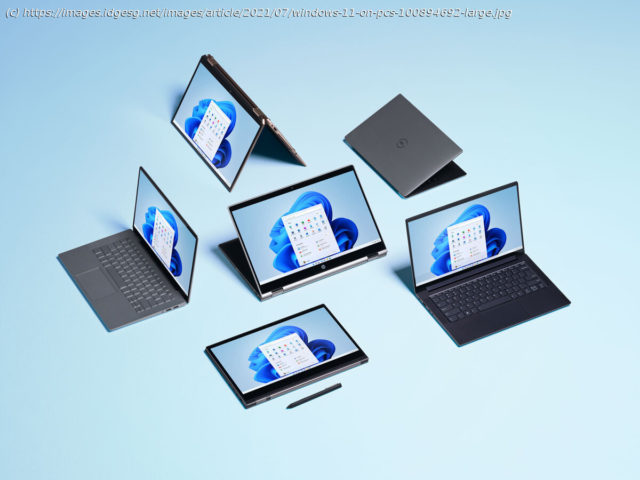Microsoft’s Windows 11 documentation tells PC buyers to look for computers with ‚Free upgrade to Windows 11‘ stickers. Where have we heard something like that before?
For long-time Microsoft watchers, there might have been a moment of déjà vu last month as the Redmond, Wash. developer announced its upcoming Windows 11 operating system. The moment? When they read this line in the company’s official Windows 11 FAQ: „If you’re currently shopping for a new PC look for ‚Free upgrade to Windows 11‘ on the fact tag.“ A decade and a half ago, Microsoft used something similar to market the PCs that were supposed to run its then-impending Windows Vista, with stickers at retail and labels online stating which machines were „Vista Capable.“ That 2006 campaign was a disaster for Microsoft. A lawsuit charged Microsoft with deceiving consumers with the Vista Capable program, which led to the release of embarrassing internal emails in which executives blasted the campaign and expressed frank opinions about the OS itself. The company created the Vista Capable program to maintain PC sales momentum, notably during the holiday season of 2006, as the January 2007 launch of Vista neared. As revealed in court documents, Microsoft had bent to pressure from Intel, which needed to unload inventory, by lowering system requirements to include a bottom-level Intel graphics chipset. Internally, some at Microsoft balked at the change in system requirements, calling Vista Capable PCs „junk“ and telling personal tales of spending thousands on a system that, in the end, couldn’t run Vista or couldn’t deal with Vista’s advanced features, including the new Aero UI (user interface). The lawsuit, which was awarded class-action status — dramatically expanding the pool of plaintiffs and, thus, the amount Microsoft might have to pay in damages assuming a loss — also revealed other bits of interest. An expert for the plaintiffs, for instance, estimated that Microsoft had made $1.5 billion from the sale of licenses for PCs marked as „Vista Capable“ in the months leading up to OS launch. Other estimates pegged Microsoft’s potential liability at $8.5 billion if a settlement was reached. There was no link between the Vista Capable debacle and the operating system’s later ultimate failure. (Vista was adopted by about one in five Windows users at its peak, less than a third reached by the precursor Windows XP or the successor Windows 7.) But the disclosures couldn’t have helped; they reinforced the reputation already being built for Vista, that it was an over-ambitious effort that needed a higher-horsepower PC.






